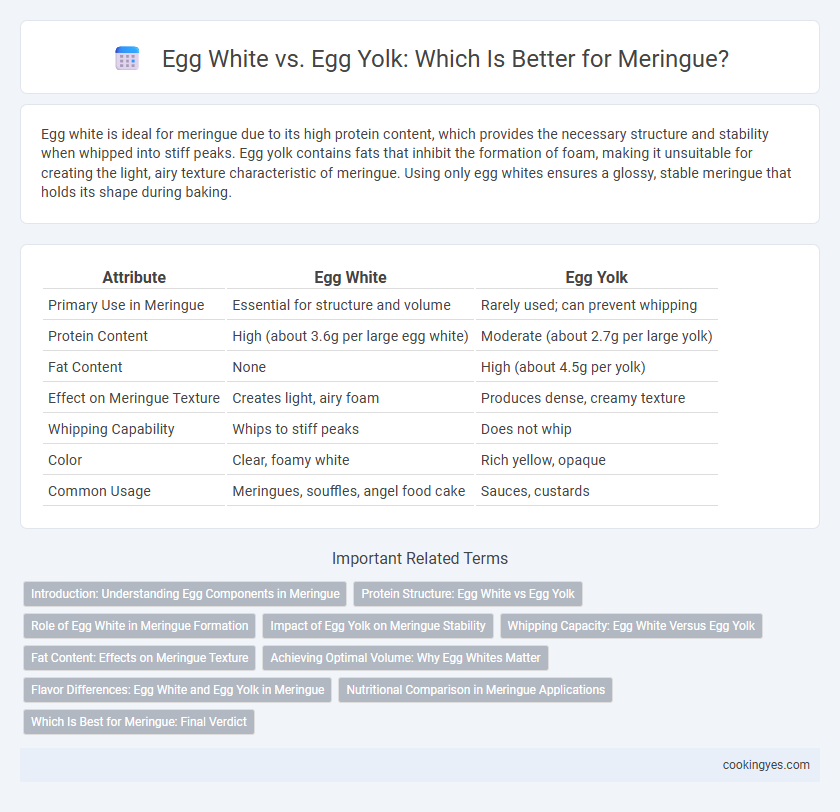Egg white is ideal for meringue due to its high protein content, which provides the necessary structure and stability when whipped into stiff peaks. Egg yolk contains fats that inhibit the formation of foam, making it unsuitable for creating the light, airy texture characteristic of meringue. Using only egg whites ensures a glossy, stable meringue that holds its shape during baking.
Table of Comparison
| Attribute | Egg White | Egg Yolk |
|---|---|---|
| Primary Use in Meringue | Essential for structure and volume | Rarely used; can prevent whipping |
| Protein Content | High (about 3.6g per large egg white) | Moderate (about 2.7g per large yolk) |
| Fat Content | None | High (about 4.5g per yolk) |
| Effect on Meringue Texture | Creates light, airy foam | Produces dense, creamy texture |
| Whipping Capability | Whips to stiff peaks | Does not whip |
| Color | Clear, foamy white | Rich yellow, opaque |
| Common Usage | Meringues, souffles, angel food cake | Sauces, custards |
Introduction: Understanding Egg Components in Meringue
Egg white, composed primarily of water and proteins such as albumin, provides the essential structure and stability needed for meringue through its ability to trap air when whipped. Egg yolk contains fats and emulsifiers, which can inhibit foam formation and reduce meringue volume and stiffness. Understanding the distinct compositions of egg white and yolk highlights why pure egg whites are preferred for achieving light, airy, and stable meringue.
Protein Structure: Egg White vs Egg Yolk
Egg whites contain about 90% water and 10% proteins, predominantly albumins, which create strong, elastic protein networks essential for stable meringue formation. In contrast, egg yolks have a complex mixture of lipids, emulsifiers like lecithin, and proteins that inhibit foam stability and cause meringues to collapse. The absence of fat and presence of abundant proteins in egg whites make them superior for achieving the ideal airy, structured texture in meringues.
Role of Egg White in Meringue Formation
Egg white plays a crucial role in meringue formation due to its high protein content, primarily albumin, which denatures and coagulates when beaten, trapping air and creating a stable foam structure. This protein matrix provides the necessary elasticity and volume, allowing the meringue to maintain its shape and achieve a light, airy texture. Egg yolk contains fats that inhibit foam formation, making egg white essential for optimal meringue stability and rise.
Impact of Egg Yolk on Meringue Stability
Egg yolk negatively impacts meringue stability due to its fat content, which interferes with the formation of stable egg white foam. Even trace amounts of yolk can prevent proper protein coagulation and air incorporation, leading to a denser and less voluminous meringue. For optimal stability and volume, pure egg whites without yolk contamination are essential.
Whipping Capacity: Egg White Versus Egg Yolk
Egg white has a superior whipping capacity compared to egg yolk due to its higher protein content, which forms stable foam structures essential for meringue. The lack of fat in egg whites allows them to trap air efficiently during whipping, resulting in volume and stiffness that egg yolks cannot achieve. Egg yolks contain fats and emulsifiers that inhibit foam formation, making them unsuitable for meringue preparation where maximum aeration is required.
Fat Content: Effects on Meringue Texture
Egg whites contain virtually no fat, making them ideal for creating stable, airy meringues with a smooth, glossy texture. In contrast, egg yolks are rich in fat, which interferes with the formation of stiff peaks and results in a denser, less voluminous meringue. The absence of fat in egg whites allows proteins to unfold and trap air more effectively, ensuring optimal texture and structure.
Achieving Optimal Volume: Why Egg Whites Matter
Egg whites play a critical role in achieving optimal volume for meringue due to their high protein content, which forms a stable foam when whipped. The absence of fat in egg whites allows air to be incorporated efficiently, creating the necessary structure and lightness that egg yolks, rich in fat and emulsifiers, cannot provide. For maximum volume and stability, only egg whites should be used, as yolks inhibit foam formation and reduce the meringue's lift.
Flavor Differences: Egg White and Egg Yolk in Meringue
Egg whites create a light, airy texture with a neutral flavor ideal for classic meringue, while egg yolks add richness and a creamy taste that can alter the dessert's delicate balance. The clean, subtle sweetness of egg whites allows sugar and flavorings to shine without interference. In contrast, the egg yolk's fat content introduces a slight heaviness and savory notes, making it less suitable for traditional meringue recipes focused on crispness and volume.
Nutritional Comparison in Meringue Applications
Egg white is primarily composed of water and protein, making it ideal for creating the stable foam necessary in meringue due to its high albumin content. Egg yolk contains fats and emulsifiers that can inhibit meringue formation, contributing to a denser texture and altering the final product's nutritional profile with higher calories and cholesterol. In meringue applications, egg whites offer a low-calorie, high-protein option, while yolks provide richness but reduce the foam's stability and increase fat content.
Which Is Best for Meringue: Final Verdict
Egg whites are best for meringue as they provide the necessary proteins that trap air and create a stable, fluffy structure, while egg yolks contain fats that inhibit this process. Meringue made solely from egg whites achieves superior volume, stiffness, and glossy texture, essential for both French and Italian meringue types. For optimal meringue results, use fresh, room-temperature egg whites without any yolk contamination.
Egg white vs Egg yolk for meringue Infographic

 cookingyes.com
cookingyes.com